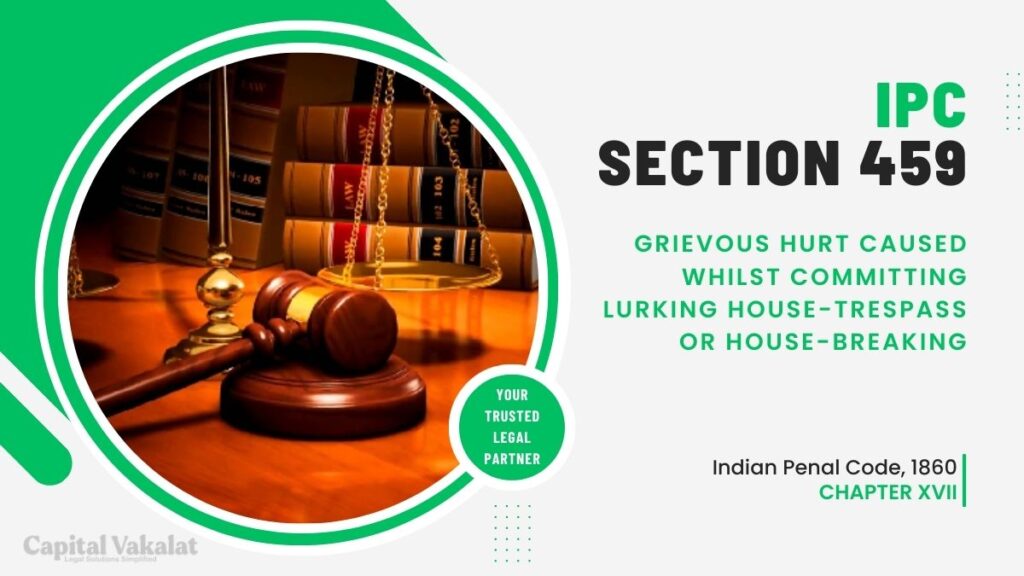In the realm of criminal law, Section 459 of the Indian Penal Code (IPC) holds a pivotal position, addressing instances of grievous hurt inflicted during lurking house-trespass or house-breaking. This provision plays a crucial role in determining the legal consequences when such offenses result in severe harm to individuals.

Understanding Section 459 is not only essential for legal professionals but also for the general public to comprehend the gravity of these crimes.
Understanding Grievous Hurt
Grievous hurt, as defined in legal terms, goes beyond mere physical injury. It encompasses injuries that are severe and cause significant harm to the victim. Distinguishing it from simple hurt, grievous hurt involves injuries of a more serious nature, often resulting in long-term consequences for the victim.
Lurking House-Trespass or House-Breaking Explained
Before delving into the specifics of Section 459 IPC, it is imperative to understand the concepts of lurking house-trespass and house-breaking. Lurking house-trespass involves entering a property surreptitiously, with the intent to commit an offense inside. House-breaking, on the other hand, entails breaking into a house with the intent to commit an offense.
Elements of Section 459 IPC
Section 459 IPC comprises various elements that need careful examination. Breaking down these components sheds light on the conditions that must be met for this section to be invoked. Understanding the nuances is crucial in ensuring a fair and just application of the law.
Legal Consequences
The legal consequences associated with Section 459 IPC are severe, reflecting the gravity of the offenses it addresses. Penalties include imprisonment and fines, with the severity depending on the circumstances of the case. Exploring judicial precedents and notable cases provides insight into how the courts interpret and apply this provision.
The Significance of Intent
Intent, or mens rea, plays a pivotal role in cases falling under Section 459 IPC. Establishing the perpetrator’s intent to cause harm is essential for the charges to be categorized under this provision. The presence or absence of intent significantly influences the severity of the charges and subsequent legal consequences.
Preventing Grievous Hurt in House-Trespass or House-Breaking
Effective prevention requires a multi-faceted approach. Homeowners can take proactive measures to enhance security, while law enforcement plays a crucial role in patrolling and responding to potential threats. Collaboration between the community and authorities is key to preventing instances that might lead to grievous hurt.
Challenges in Enforcing Section 459 IPC
Enforcing Section 459 poses its own set of challenges. Identifying perpetrators, gathering sufficient evidence, and ensuring successful convictions are hurdles that law enforcement and the legal system must address. Overcoming these challenges is essential for the effective implementation of the law.
Public Awareness and Education
Creating public awareness about Section 459 IPC is vital for fostering a sense of vigilance in communities. Educating individuals about the law and its implications empowers them to take proactive measures, contributing to the collective effort to prevent lurking house-trespass or house-breaking incidents.
Conclusion
In conclusion, Section 459 IPC serves as a crucial deterrent against grievous hurt caused during lurking house-trespass or house-breaking. Understanding the elements, legal consequences, and challenges associated with this provision is essential for both legal professionals and the general public. The emphasis should be on prevention through public awareness, collaboration, and a concerted effort to address the challenges in enforcing this section.
Frequently Asked Questions
What distinguishes grievous hurt from simple hurt in legal terms?
Grievous hurt involves more severe injuries with long-term consequences, while simple hurt pertains to relatively minor injuries.
How can homeowners enhance security to prevent lurking house-trespass or house-breaking?
Implementing security measures such as robust locks, surveillance systems, and community vigilance can contribute to preventing such incidents.
What challenges do law enforcement face in enforcing Section 459 IPC?
Challenges include identifying perpetrators, gathering evidence, and ensuring successful convictions, requiring a coordinated effort between law enforcement and the legal system.
How can the public contribute to preventing instances covered by Section 459 IPC?
Public awareness and education are key. Vigilance, reporting suspicious activities, and fostering community cooperation play crucial roles in prevention.